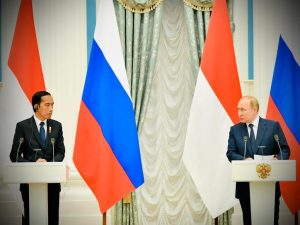Indonesian President Joko Widodo says that he has extracted an assurance from his Russian counterpart Vladimir Putin that he will permit much-needed shipments of food and fertilizer supplies to be exported from Ukraine.
Jokowi, as he is commonly known, made the announcement after meeting Putin yesterday, the final leg of a round of shuttle diplomacy between Kyiv and Moscow and the first trip by an Asian leader to the war zone.
In a statement after the meeting, Jokowi thanked the Russian leader for agreeing to open a sea route for Ukrainian wheat exports amid escalating concerns over the global food crisis.
“I really appreciate President Putin who said earlier that he would provide security guarantees for food and fertilizer supplies both from Russia and from Ukraine. This is good news then for the sake of humanity,” Jokowi said, according to a report from BenarNews.
Jokowi is this year’s chair of the G-20 economic grouping, which counts Russia among its members. In April, the United Nations also appointed him as one of six leaders of a Global Crisis Response Group, which aims to address the global threat of hunger posed by the war in Ukraine.
Since attending the G-7 Leaders’ Summit in Germany earlier this week, the Indonesian leader has traveled on to both Ukraine and Russia in an attempt to mediate the ongoing war. His most pressing immediate goal was to avert the looming global food crisis prompted by Russia’s February 24 invasion, which has disrupted production and exports from one of the world’s most productive agricultural regions.
During his meeting with Ukrainian President Volodymyr Zelenskyy in Kyiv a day earlier, Jokowi reportedly stressed the importance of halting the fighting and said that “all efforts must be made to ensure Ukraine can resume exporting food.” In Moscow, he added that he had conveyed a message from Zelenskyy to Putin and expressed his “readiness to be a communication bridge between the two leaders.” While in Kyiv, he also repeated his invitation to Zelenskyy to attend the G-20 Leaders’ Summit in Bali in November, an event that Putin is also expected to attend.
Like many Asian nations, Jokowi’s administration has condemned the Russian invasion but has been relatively cautious in its condemnations of Moscow, fearing the economic impacts of a prolonged conflict and complications to its G-20 presidency. Western nations have threatened to boycott this year’s G-20 meetings, including the summit in Bali, if Putin is allowed to attend. In this context, Jokowi’s “peace mission” was a good way of getting on the front foot ahead of this year’s big G-20 events.
During his meeting with Jokowi, Putin said that Russia has no restrictions on fertilizer and food exports, according to the Russian state news outlet TASS.
“Early last year, we thought about supporting our own agriculture at first, but volumes of fertilizer production in Russia are such at present that we have no restrictions for supplies of these products to the international market. The same pertains to foods,” Putin said, according to TASS. The report added that Russia is ready “to fully meet the fertilizer demand of agricultural producers from friendly countries” – a formulation that suggests many nations in the Global South will have good reason to remain neutral about the ongoing conflict.
It is unclear whether Jokowi’s intervention will have much impact on the course of the war in Ukraine, which seems increasingly likely to harden into a “frozen” conflict. It is also unclear whether Putin will truly allow untrammeled exports from Ukraine, given the number of agreements for ceasefires and humanitarian corridors that have failed so far, to say nothing of the fact that the threat of a global food crisis grants him powerful leverage over his Western adversaries. Nonetheless, any additional supply that Jokowi has managed to secure is a welcome development for those nations most exposed to the looming global food crisis.













